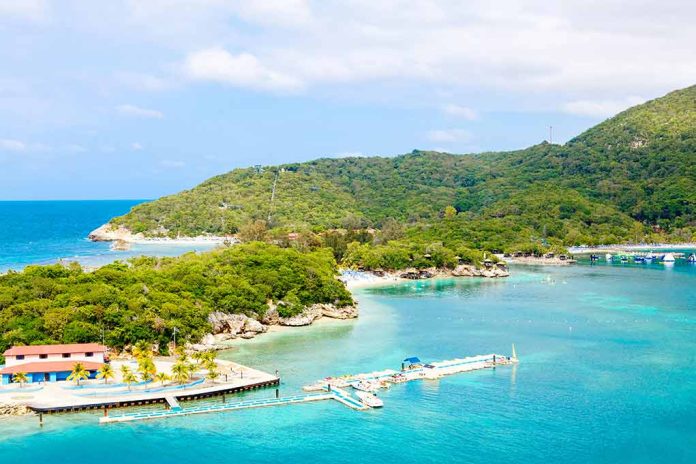
Two shark attacks in a single week have left Hilton Head Island’s pristine beach reputation in jeopardy as tourists reconsider their summer vacation plans amid heightened safety concerns.
Key Takeaways
- A second shark attack occurred at Hilton Head Island’s Coligny Beach Park on Sunday, just days after a similar incident on June 17th.
- Both victims sustained leg lacerations consistent with shark bites, with the first victim requiring an airlift to a Savannah hospital.
- Hilton Head Island employs a comprehensive beach flag warning system and wildlife monitoring to protect visitors.
- Despite the attacks, Hilton Head remains the #1 ranked South Carolina beach by U.S. News and World Report in 2024.
- The incidents come amid a national pattern of shark encounters, with 28 unprovoked shark bites recorded across the U.S. in 2023.
Paradise Disrupted: Two Attacks in Seven Days
Hilton Head Island, South Carolina’s premier beach destination, has been rocked by two shark attacks within a single week, raising serious concerns about visitor safety during the peak summer tourism season. The most recent incident occurred Sunday at Coligny Beach Park, where emergency responders treated a victim with significant leg lacerations consistent with a shark bite. This attack follows a similar incident on June 17th, creating a pattern that has both locals and visitors on high alert. In both cases, victims required immediate hospitalization, though thankfully, the injuries were classified as non-life-threatening.
“A second beachgoer has been bitten by a shark on Hilton Head Island, South Carolina, within one week,” said local officials.
Safety Protocols Under Scrutiny
Island officials have been quick to emphasize their existing safety measures in the wake of these incidents. Hilton Head employs a comprehensive flag warning system that uses purple flags to indicate dangerous marine life, red flags for rough conditions, and yellow flags for moderate to light conditions. These visual alerts are supplemented by the Shore Beach Service (SBS), a team dedicated to monitoring wildlife activity near swimming areas. When potential threats are identified, beach personnel move rapidly to clear the water, highlighting the serious approach to visitor safety.
“Beaches and oceans are dynamic natural environments,” said Heather Woolwine.
According to Heather Woolwine, Hilton Head Island’s communications director, the response system is designed for immediate action. When threatening marine life is spotted, “the SBS team goes quickly into action to get people out of the water,” she explained. This swift response capability is essential for a destination that depends heavily on its reputation for safe, family-friendly beaches. Despite these measures, the back-to-back attacks have raised questions about whether additional precautions or monitoring systems might be necessary during peak season.
National Context: Shark Encounters Across America
The Hilton Head incidents fit into a broader national pattern of shark encounters. According to the Florida Museum of Natural History’s International Shark Attack File, America recorded 28 unprovoked shark bites in 2023. Florida led the nation with 14 incidents, while South Carolina reported two for the entire year – a number already matched in just one week at Hilton Head this summer. Only one of last year’s attacks proved fatal, occurring in Hawaii. These statistics provide important context for understanding the relative rarity of serious shark encounters, even as the recent Hilton Head incidents command headlines.
“There were 28 unprovoked shark bites in the U.S. last year,” according to the Florida Museum of Natural History’s International Shark Attack File.
The timing of these attacks couldn’t be worse for Hilton Head’s tourism industry. Recently crowned the number one beach in South Carolina by U.S. News and World Report for 2024, the island typically experiences its highest visitor traffic during summer months. Local business owners are understandably concerned about potential cancellations as news of the shark encounters spreads across social media and national news outlets. However, many loyal visitors understand that such incidents, while concerning, remain statistically uncommon in the broader context of beach safety.
Moving Forward: Balancing Tourism and Safety
As Hilton Head officials work to reassure visitors about beach safety, they face the delicate task of acknowledging legitimate concerns without unnecessarily alarming potential tourists. The island’s economy depends heavily on its reputation as a premier beach destination, making these incidents particularly challenging from both safety and public relations perspectives. Officials continue to emphasize their commitment to vigilant wildlife monitoring and swift response protocols, while also reminding visitors that shark encounters remain extraordinarily rare events when considering the millions of beach visits that occur without incident each year.
For families planning Hilton Head vacations this summer, experts recommend staying informed about beach conditions through the flag warning system, swimming in groups rather than alone, avoiding dawn and dusk swimming when sharks are most active, and immediately reporting any unusual marine life sightings to beach personnel. By combining official safety measures with common-sense precautions, visitors can continue to enjoy Hilton Head’s beautiful beaches while minimizing already low risk factors for dangerous encounters.













